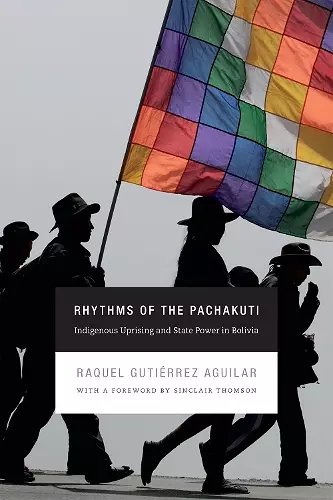Rhythms of the Pachakuti
Indigenous Uprising and State Power in Bolivia
Raquel Gutierrez Aguilar author Stacey Alba D Skar translator
Format:Hardback
Publisher:Duke University Press
Published:24th Aug '14
Currently unavailable, and unfortunately no date known when it will be back
This hardback is available in another edition too:
- Paperback£22.99(9780822356042)

In the indigenous Andean language of Aymara, pachakuti refers to the subversion and transformation of social relations. Between 2000 and 2005, Bolivia was radically transformed by a series of popular indigenous uprisings against the country's neoliberal and antidemocratic policies. In Rhythms of the Pachakuti, Raquel Gutiérrez Aguilar documents these mass collective actions, tracing the internal dynamics of such disruptions to consider how motivation and execution incite political change.
"In Rhythms of the Pachakuti we can sense the reverberations of an extraordinary historical process that took place in Bolivia at the start of the twenty-first century. The book is the product of Raquel Gutiérrez Aguilar's political engagement in that historical process. . . . Though of Mexican nationality, [she] was intimately involved in Bolivian politics for many years and acquired a quasi-legendary status there as an intense, brilliant activist and radical intellectual. . . . [Her account is] . . . itself a revolutionary document. . . . Rhythms of the Pachakuti deserves to stand as a key text in the international literature of radicalism and emancipatory politics in the new century."—Sinclair Thomson, from the foreword
“[A] detailed examination of diverse political and social movements that between 2000 and 2005 challenged the neoliberal status quo, and in the course of a bitter electoral conflict brought the Indigenous leader Evo Morales to power. The author delves deeply into the history of Peru…. Highly recommended.” -- O. Pi-Sunyer * Choice *
“[T]his book—as political memoir and social analysis—offers an intriguing inside view of the kinds of issues that drove debate among a few members of the intellectual vanguard during Bolivia’s most recent cycle of popular unrest.” -- Brooke Larson * Hispanic American Historical Review *
"Rhythms of the Pachakuti is a well-researched, well-argued and productive text for scholars interested in understanding social movements. It gives rich accounts of the Bolivian uprisings it studies, making it a useful text for scholars of the region, and provides scholars with useful tools for thinking about the practices of these uprisings as meaning-making practices." -- Lauren E. Deal * Social Anthropology *
"[T]his book has tremendous value for graduate students and general readers interested in following the contemporary Latin American left. The book, published originally in Spanish in 2008, also represents an excellent resource for those interested in solid Marxist theory and sociological analysis. For this reason, it will be an excellent addition to graduate courses in Latin American Revolutions and social change." -- Waskar T. Ari-Chachakí * American Historical Review *
"Historians will long rely on this to better understand not only Bolivia’s early twenty-first century revolts, but also the post-statist ideas fueling recent anti-capitalist movements from Madrid to New York City." -- Thomas C. Field Jr. * Canadian Journal of History *
"One of the most valuable aspects of this analytically sophisticated book, which could be assigned to graduate students and upper-level undergraduates, is that it defies encapsulating Bolivia’s popular uprisings under one single variable. In contrast to similar works that focus only on the ethnic dimensions, the book captures how multiple forces—indigenous people, migrants, peasants, and workers— together overthrew the Bolivian political system. This more complex picture better positions the reader to understand the challenges of post-insurrection Bolivia." -- Carmen Soliz * History: Reviews of New Books *
"In presenting authentic grassroots forces of emancipation, Gutiérrez Aguilar has given us a rich and representative volume, with some important and challenging ideas. . . . This book serves as a critical foundation for the larger questions of social transformation and radical discourse." -- Yuliana Kenfield * Canadian Journal of Latin American and Caribbean Studies *
"The work is an outstanding contribution to the political anthropology of Latin America. . . . It offers a decolonizing entrée into Bolivian political thought and practice that counters the often paternalistic and detached style of Northern writers." -- Bret Gustafson * Journal of Anthropological Research *
"Of the many studies of Bolivia’s popular uprisings of 2000–2005, Raquel Gutiérrez Aguilar’s participatory-observer account stands out. In addition to furnishing an innovative framework for understanding the 'rhythms' of social struggle during those years, the book grapples with some of the tensions and dilemmas common to diverse emancipatory struggles." -- Kevin A. Young * Ethnohistory *
“Gutiérrez-Aguilar provides a unique and valuable perspective on Bolivian politics.” -- Hans Buechler * American Ethnologist *
"The depth of access and the richness of the sources make this book . . . a document that is close to being a primary source while it is also written with chronological and analytical distance." -- Carmen Martínez Novo * Latin American Research Review *
ISBN: 9780822355991
Dimensions: unknown
Weight: 585g
336 pages